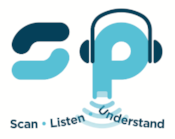Edutech strategy is a new era for schools
At the beginning of April, the U.K. government unveiled their Education Technology strategy at the Schools and Academies Show in London. The new Government strategy aims to transform the use of technology in education to reduce teacher workload, boost student outcomes, and help reveal the potential for those with special educational requirements and disabilities. Scanning Pens has been working towards these goals since our founding and we couldn’t be more pleased to learn that the Government has national plans to address such important issues in education.
One of the key challenges that the strategy hopes to address is promoting the use of innovative assistive technology to support SEND students. Finding the best technology that suits the individual’s needs is a continue problem SENCos face and the Government aims to address this.
Damian Hinds, the U.K. Secretary of State for Education, stated:
“This strategy is just the first step in making sure the education sector is able to take advantage of all of the opportunities available through EdTech. “
“Technology is an enabler and an enhancer. For too long in education, technology has been seen as something that adds to a teacher’s workload rather than helps to ease.”
The Education Technology strategy will be working in collaboration with organisations throughout the country to ensure they meet the needs of teachers. One such collaboration is with the British Education Suppliers Association (BESA), where schools can receive help with identifying the right product for their students through LendED, a free online service designed to aid schools in finding and purchasing educational technology.
Scanning Pens technology can be found on the LendED portal as well as our own sites where schools can sign up for free 30 day trials of any of our products. The ExamReader was recently commended at Bett after proving to be a vital support for students sitting their exams. The user-friendly text-to-speech scanning pen helps students build confidence and literary independence by helping them with their reading comprehension. The ExamReader has shown time and time again that it not only improves student attainment rates, but saves schools time and money by promoting student reading independence.
Our technology addresses many of the Governments new strategies while saving schools money. Visit www.examreader.com to learn more about the ExamReader

